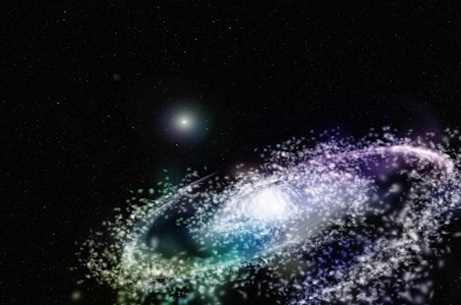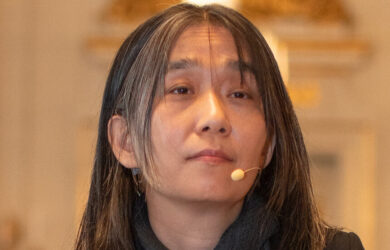
Jonathan Diaz's research tests a theory that the Sagittarius Dwarf Galaxy has interacted with the Magellanic Clouds.
Like many other children, Jonathan Diaz used to look up at the sky and marvel at the immensity of our Galaxy.
His interest was driven by a passion for story-telling, for understanding the narrative of the cosmos and trying to communicate and connect with other worlds.
The difference is that he didn’t content himself just with looking. At high school he took part in a programme which allowed him to take two astronomy courses at Georgia State University. “I was greedy for knowledge and devoured textbooks as well as talking to the lecturers before and after classes,” he says.
Jonathan’s father is a professor of business and head of the real estate department at Georgia State University and helped him get the place on the astronomy courses.
Both his dad and his mum, who teaches primary school students, encouraged him along the academic path. “My parents instilled a love of learning in me,” he says, “and my dad showed me the benefits of being an academic – being able to pursue your interests when you want to, when you are inspired. I routinely stay up till 6am to do research and an academic career accommodates this. I couldn’t do a 9-5 job.”
Jonathan, who spent all his early life in Atlanta, Georgia, is very close to his sister who is also very academic and is currently a post-doc at Harvard in the field of aquatic biogeochemistry. “She takes care of the Earth and I take care of the sky,” he laughs. “We always had a real interest in the natural world and were brought up to always question everything, to be curious about the world and go out and find answers to our questions.”
At school Jonathan was first interested in studying film. Both at school and university he was involved in film-making clubs. His films tend to revolve around story-telling.
He says film-making forced him to be more sociable. It also allows him a creative outlet. He writes the scripts and his films have been shown at international film festivals. “In 2003, I was entered for the student competition at the Savannah Film Festival in Georgia. I was in high school at the time,” he says, “but the other films were made by students studying film at university. That experience was important for me because it taught me to be confident with my creative work, especially when presenting it to an audience.”
In addition to film-making, Jonathan has also been involved in acting and writes his own songs for the guitar. He equates the creative process involved in making films and songs with the discovery element of research.
Jonathan did his undergraduate degree at Georgia Tech where he majored in physics which is vital for a future career in astronomy.
For the last year and a half he has been in Australia doing research for his MSc. “I wanted to see more of the world,” he says. His girlfriend is from Australia and Western Australia is firmly on the astronomy research map since it is the potential site of the SKA radio telescope.
It is the perfect spot for studying the Magellanic Stream – a high-velocity cloud of gas connecting the dwarf galaxies known as the Large and the Small Magellanic Clouds – as you can only see the Magellanic galaxies in the southern hemisphere. For his MSc research, Jonathan constructed computational models of the galactic interactions which may have triggered the formation of the Magellanic Stream. He found that it was likely to be the result of a recent dynamic coupling between the Large and Small Magellanic Clouds.
His research in Cambridge, where he will study for a PhD in Astronomy, is related. In Australia he became very interested in the Milky Way and the smaller satellite galaxies around it and will study their evolution at the Institute of Astronomy. “This is our home and we need to understand our home galaxy,” he says. “When satellite galaxies come in touch with the Milky Way they produce tidal tails of stars and gas which can be pulled apart in beautiful streams,” he says. By constructing computational models researchers can work on possible different histories of the interaction between galaxies and their satellites and try to recreate the stream that the interactions produce. Jonathan intends to test a theory that the Sagittarius Dwarf Galaxy whose stream is composed of stars, has interacted with the Magellanic Clouds.
Jonathan is very excited to be studying at Cambridge. Because of his interest in narrative, it is the history of the city that particularly appeals to him. “Cambridge is one of the few places in the world that has a sense of mystery and excitement about it. You get the sense that the ghosts of people like Isaac Newton still roam the halls.”
His Gates interview was conducted via Skype from Australia. He says he enjoyed the interview and was sad when it finished as he loves talking about his research and ideas.
He is keen to straddle the world of research and teaching. He admires scientists like Stephen Hawking, people who are able to explain academic research to the general public. “One day I hope to make a similar contribution by making the esoteric world of astrophysics more accessible to a wider audience, “ he says. “Perhaps one day I will write a book or give a public lecture that might inspire people to learn more.” People like his teenage self, who would sit looking up at the stars, imagining different universes and different stories.
Picture credit: nongpimmy and www.freedigitalphotos.net.












